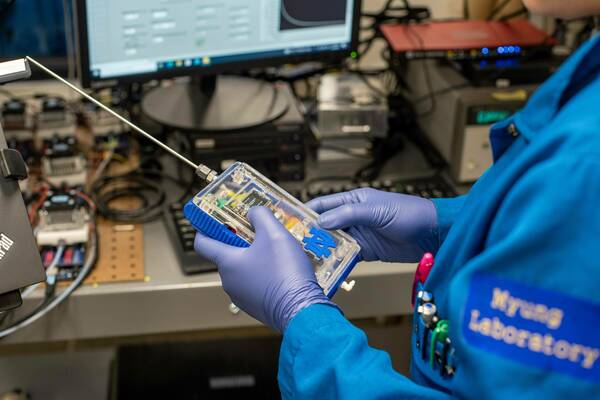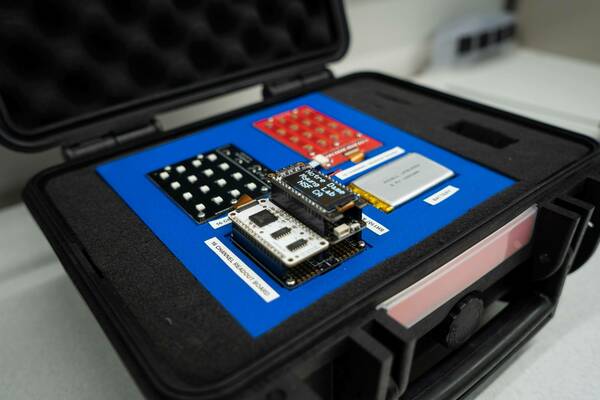Researchers to develop electronic nose for rapid disease detection

The U.S. National Science Foundation (NSF) Convergence Accelerator Program has awarded $650,000 to the University of Notre Dame to support the development of an advanced electronic nose that researchers say could help prevent the next pandemic.
“Human health is linked with animal health, and we saw during the COVID-19 pandemic what can happen when a disease passes from animals to humans and continues to spread uncontained,” explained Nosang V. Myung, the Bernard Keating-Crawford Endowed Professor in the Department of Chemical and Biomolecular Engineering.
Myung, who also directs the micro- and nanoscale biomedical instrumentation theme at the Berthiaume Institute for Precision Health, will lead the development of the new technology. His team is one of 16 teams awarded under Track L: Real-World Chemical Sensing Applications.
Myung said the electronic nose will build on existing technologies developed in his lab at Notre Dame. It will complement conventional disease prevention and management approaches by adding real-time disease monitoring.

To build the device, Myung and his team of collaborators will develop new, high-sensitivity materials using nano-engineering processes. Still, Myung says the device will be portable and affordable, so it can be used on-site by farmers, packing plant inspectors, animal husbandry technicians and others.
“The idea is to use data to make critical decisions quickly — to isolate or treat infected animals, for example — to minimize the spread of diseases,” Myung explained.
During the project’s first phase, Myung and his collaborators will equip the electronic nose to detect avian flu, which resulted in more than 40 million animal deaths and over $2.5 billion in economic losses during a 2022 outbreak. The researchers will gather data from infected birds and healthy birds and will employ machine-learning techniques to train the electronic nose to distinguish between the two.
At the same time, Emily Stoler, assistant director of risk assessment at Notre Dame’s IDEA Center, will work with Myung and his team to evaluate and pursue potential commercial opportunities associated with the electronic nose technology.
During the project’s second phase, the researchers will train the electronic nose to detect an array of other infections, both in animals and in humans. The end result will be a flexible monitoring system that can be taken to sites where infections are most likely to occur or spread.
Finally, the researchers will develop a user-friendly graphic interface that allows users to operate the device wirelessly using a smartphone and see results in real-time.

Although it has been two decades since a landmark experiment found that dogs were effective at using smell to detect human bladder cancer, the use of smell for disease diagnosis remains rare. Myung said the new device has the potential to show that smell is a valuable surveillance technique that can be affordable, accessible and also highly sensitive. The team predicts that the electronic nose will be capable of detecting smells at a sensitivity of one part per billion.
The academic collaborators who will join Myung in developing the electronic nose technology include:
- Richard Bowen, a professor of reproductive biology and virology at Colorado State University. Bowen also directs the Animal Models Core of the Rocky Mountain Regional Center of Excellence for Biodefense and Emerging Infectious Disease.
- Yamil Colón, assistant professor in Notre Dame’s Department of Chemical and Biomolecular Engineering. Colón is an expert in computational materials discovery and design.
- Bruce Kimball, a chemical ecologist at the Monell Chemical Senses Center. Monell is an independent, nonprofit scientific institute dedicated to interdisciplinary basic research on taste and smell.
To learn more, visit myung-lab.com.
Originally published by at research.nd.edu on Feb. 16.
Latest ND NewsWire
- Notre Dame student uses ‘American Ninja Warrior’ spotlight to fight world hunger via his nonprofitOn July 14 (Monday), a University of Notre Dame business student will compete in the semifinal round of NBC’s “American Ninja Warrior” to advocate for an end to world hunger, an ambition he works toward by making knotted dog toys and collecting donations to his nonprofit.
- In sub-Saharan Africa, 1 in 6 cancer medications found to be defectiveSerious quality defects were found in a significant number of cancer medications from sub-Saharan Africa, according to new research from the University of Notre Dame.
- Alumni Association awards 2025 Lennon Life PrizesThe Notre Dame Alumni Association recognized nine alumni clubs as recipients of the Lennon Life Prize — part of the Chuck and Joan Lennon Gospel of Life Initiative, a set of programs focused on encouraging the University’s dedicated network of clubs to uphold the value of life at all stages.
- Prioritizing prenatal care may decrease low birth weight outcomes in The Gambia, Notre Dame research findsA new study co-authored by University of Notre Dame researchers highlights the importance of prenatal care for improving the health of mothers and newborns, providing evidence that can inform policy.
- Navigating the waters of peace: Researchers address challenges, opportunities in implementation of Colombia's Peace AgreementNearly half of the commitments outlined in Colombia's historic peace accord face significant challenges and may not happen in time unless policymakers make several key interventions, warns a new report from Notre Dame's Peace Accords Matrix. The report offers a blueprint to salvage an accord that has lagged behind its implementation deadlines, putting its legacy at risk. It highlights timely fixes that can strengthen the agreement.
- ‘Returnless returns’ boost brands among consumersReturnless returns can increase brand support by fostering goodwill, according to John Costello and Christopher Bechler, assistant professors of marketing at Notre Dame’s Mendoza College of Business. Their study, “Just Keep It: When and Why Returnless Product Returns Foster Brand Support,” is forthcoming in the Journal of Marketing Research.













